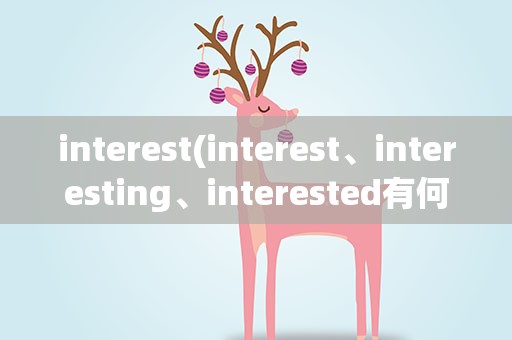interest 和interested的区别
(1)interest用作不可数名词时意为“兴趣,关心,重要性,影响,利息,利益,利害”.用作动词时意为“使发生兴趣,引起...的注意”,其主语多为事或物.

eg:Ihavenointerestinyourplan.我对你的计划没有兴趣.
(2)interesting形容词主语通常是物.可以作表语,也可以作定语.
eg:1.Thebookisveryinteresting.
这本书很有趣.(表语)
2.Thestorysoundsinteresting.
这个故事听起来很有趣.(表语)
3.Thatisaninterestingfilm.
那是一部有趣的电影.(定语)
4.Thisisaninterestingbook.
这是本有趣的书.(定语)
(3)interested形容词意为“感兴趣的”;“对……感兴趣”,主语通常是人,且多用于be/get/feel/becomeinterestedin结构中.
a.beinterestedinsth.对某事感兴趣
b.beinterestedindoingsth.对做某事感兴趣
eg:Heisinterestedinthefilm.
他对这部电影感兴趣.
IaminterestedinEnglish.
我对英语感兴趣.
Heisinterestedinplayingfootball.
他对踢足球感兴趣.
interest、interesting、interested有何区别
一、词性不同
1、interest是动名词。
2、interesting是现在分词而来的形容词。
3、interested是过去分词而来的形容词。
二、一词多义不同
1、interest作名词意思有兴趣;嗜好;利息;股份。作动词意思是使…感兴趣。
2、interesting只作形容词意思是有趣的;引人入胜的。
3、interested只作形容词意思是感兴趣的;有利害关系的。
三、用法不同
1、interest
n. (名词)
1)interest用作名词的基本意思是“兴趣”,指对某种事物的爱好,也可指感兴趣的事,既可用作可数名词,也可用作不可数名词。
2)interest也可表示“趣味,引起注意之性质”,是不可数名词,其后常接介词in。
3)interest也可作“爱好,嗜好”“利益”解,是可数名词。作“利益”解时常用复数形式。
2、interesting
adj. (形容词)
1)interesting的意思是“令人感兴趣的。有趣的”,指人或物时,表示具有能唤起某人心理或情感方面兴趣的能力,而不表示兴趣的程度或原因;指书、戏剧、影视等时,则表示具有较强的娱乐性,而且能使人消愁解闷。
2)interesting在句中可用作定语、表语或宾语补足语。
3)interesting的比较级和最高级是moreinteresting和mostinteresting。
3、interested
有被动意义,意为“感兴趣的”,其主语或修饰的名词只能是人,其后常接介词in或动词不定式。
interest的三种用法
interest作及物动词;interest作名词;interested是形容词。interest用作名词的基本意思是“兴趣”,指对某种事物的爱好,也可指感兴趣的事,既可用作可数名词,也可用作不可数名词。interest也可表示“趣味,引起注意之性质”,是不可数名词,其后常接介词in。
interest的三种用法一、作名词的用法:
1、interest用作名词的基本意思是“兴趣”,指对某种事物的爱好,也可指感兴趣的事,既可用作可数名词,也可用作不可数名词。interest也可表示“趣味,引起注意之性质”,是不可数名词,其后常接介词in。
2、interest也可作“爱好,嗜好”“利益”解,是可数名词。作“利益”解时常用复数形式。interest还可作“利息”解,是不可数名词。interest还可表示“所有权”“股份”,可用于单数形式,也可用于复数形式。
二、作动词的用法:
1、interest的基本意思是“使某人产生兴趣”,还可作“引起…的意愿”解,其主语可以是人,也可以是物或事。interest是及物动词,接名词或代词作宾语。动词宾语为sb时,表示“使(某人)对…感兴趣”,动词宾语为oneself时,表示主语本身“对…感兴趣”。
2、interest后常接in,表示“对…感兴趣”。interest的过去分词interested和现在分词interesting都可用作形容词,在句中作表语或定语。
3、intheinterest(s)oftruth指“为了真理”,intheinterest(s)ofpeace指“为了和平”,interest后的s可选择加或不加;
4、interest后面用的介词不同,意思就会不同。例如:
(1)Ihave(take)nointerestinthissubject.
这里interest指感觉。
(2)Thissubjecthasnointerestforme.
这的interest指引起这种感觉的特质。
(3)Istudythissubjectwithgreatinterest.
句中with...interest为状语短语,interest指兴趣。
(4)Thissubjectisofgreatinteresttome.
句中of...interest是形容词短语,interest指引起兴趣的的特质。
interest的用法例句1.Wehavetheinterestof500,000customerstothinkof.
我们得为50万名顾客的利益着想。
2.Hopesofanearlycutininterestratesbolsteredconfidence.
利率有望早日下调,从而增强了人们的信心。
3.Interestrateswouldcomedownastherecoverygatheredpace.
随着复苏的加速,利率会降下来。
4.Thegovernmentwasrighttomaintaininterestratesatahighlevel.
政府维持高利率的做法是正确的。
5.Ifraginginflationreturns,theninterestrateswillshootup.
如果再发生严重的通货膨胀,那么利率就会迅速上调。

